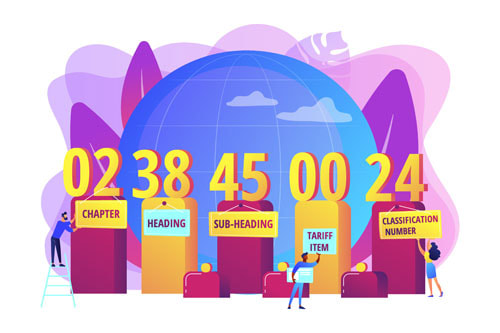
The HTS is a 10-digit code used by U.S. Customs to determine tariffs on commodities coming into the U.S. There are over 17,000 possible HTS classifications, so it can get confusing to find the right classification code for your specific goods and products. The U.S. government has a searchable HTS tool that you can use to find the HTS code that applies to your needs.
Even with the HTS search tool, you may be confused about what code applies to the commodities that you are importing. It’s important to find the right HTS code because it provides different information to agencies like:
- Determining the duty rate applied to imported commodities.
- Helps U.S. Customs streamline the process to examine, document, and request information about a shipment.
- Identify specific regulations and other rules applied to imported goods and products.
- Determine if goods and products are subject to duty exemption under specific trade agreements.
- Allow U.S. agencies to collect import and export statistics.
- Determine if different trade laws apply to imported products.
It’s important to pay special attention to HTS codes because tariffs vary greatly between different codes of imported products. Customs spends a lot of time and resources to audit documents and data from importers once their products have been cleared for entry to the U.S. This process is where common mistakes with HTS classification are found, and you could receive a bill months after your product is sold if you do not classify commodities properly.
Penalties For Incorrect HTS Classifications
If you import anything into the United States, then you should talk with a customs broker or customs consultant to determine the correct HTS classification for your products. It’s critical that you classify your products accurately because it is ultimately your responsibility as the importer to get the HTS classification right.
As an importer, you are at risk for numerous penalties if you do not declare the correct HTS classification of your products. Most penalties originate from improper classification, value, country of origin, or the products and goods that are invoices.
Companies have come under hefty financial and legal penalties for inaccurate classification, and Customs has even liquidated damages if importers don’t follow proper procedures.
Each time an importer is penalized for HTS classification issues, they are placed in a compliance database that is maintained by Customs. This record designates the importer as a higher risk, and this can lead to more frequent Customs inspections or delayed processing time.
Knowing The HTS or Schedule B Code For Your Product Is Critical!
We are classification experts. That means our team has spent thousands of hours classifying tens of thousands of various items for our clients over the years. At first glance, the Harmonized Tariff Schedule (HTS) can seem overwhelming and indecipherable. Let us help you navigate the complexities by assigning the correct codes to your products, the first time.
Whether you export one or 100,000 products per year, we know how to locate the right chapter, heading and sub-heading to determine your item’s classification. We also rely on the appropriate General Rules of Interpretation (GRIs), as well as Customs rulings, to arrive at the most accurate classification for your item.
Work With A Trade Consultant Today!
Customs looks to you and your business leaders to exercise due diligence with all of your import transactions. There are a number of variables that you have to consider when you import any product into the U.S., and due to these complexities, you are encouraged to be proactive when reviewing your import transactions and HTS classifications.
Our expert import consultants can help you classify your commodities and guide your business through the process to ensure you avoid costly penalties when importing commodities into the U.S. HTS classification errors are the most common error made by most importers, so having HTS Compliance experts on your side can help ensure the accuracy of your HTS classifications.